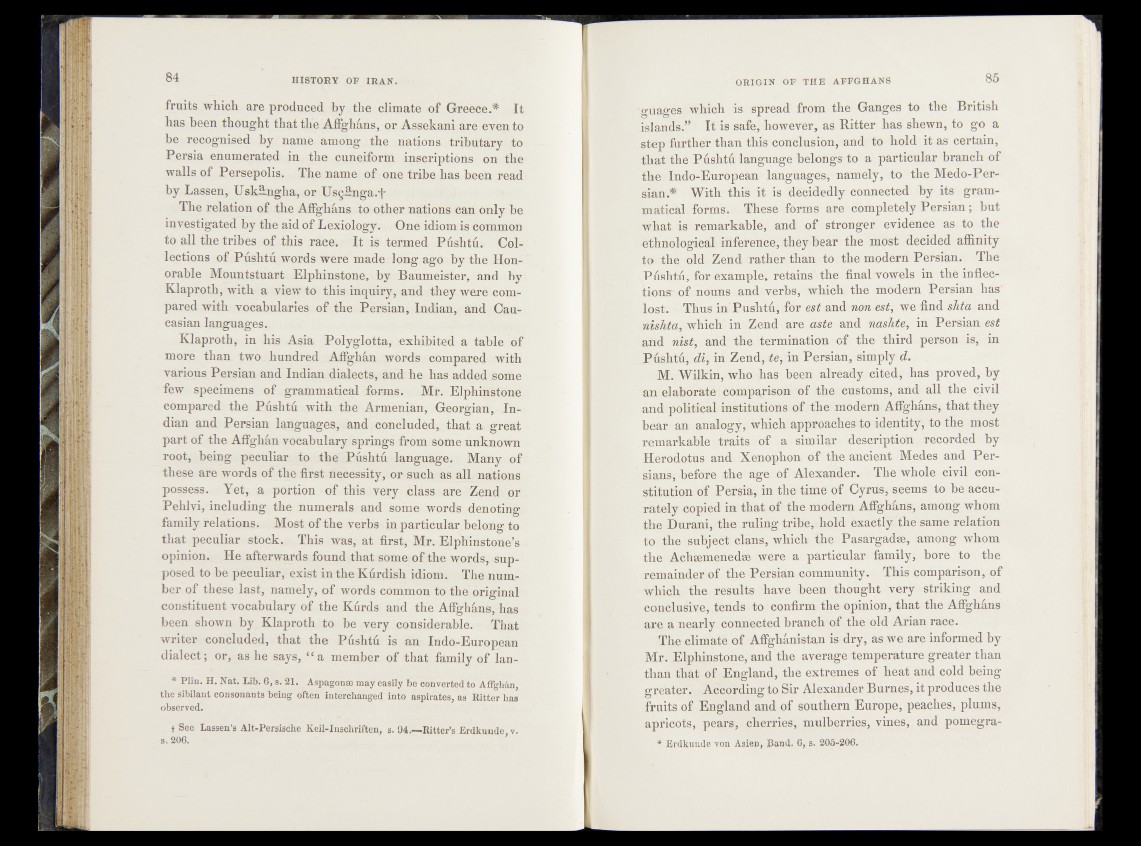
fruits which are produced fey .the climate of Greece* It
has been thought that the Affghdns, or Assekani are even to
be recognised fey name among the nations, tributary to
Persia enumerated in the cuneiform inscriptions on the
walls of Persepolis. The name of one tribe has been read
fey Lassen, Usküngha, or Usgünga.f.
The relation of the Affghhns to other nations can only fee
investigated by the aid of Lexiology. One idiom is common
to all the tribes of this race. It is- termed Phshth. Collections
of Pfishtu words were made long ago by the Honorable
Mountstuart Elphinstone, by Baumeister, and by
Klaproth, with a view to this inquiry, and they were compared
with vocabularies of the Persian, Indian, and Caucasian
languages.
Klaproth, in his Asia Polyglotta, exhibited a table of
more than two hundred Affghhn words compared with
various Persian and Indian dialects, and he has added:some
few specimens of grammatical forms. Mr. Elphinstone
compared the Pushtu with the Armenian, Georgian, Indian
and Persian languages, and concluded, that a- great
part of the Affghan vocabulary springs from some unknown
root, being peculiar to the Pushtu-language. Manyrbf
these are words of the first necessity, or such as all nations
possess. Yet, a portion of this very class are Zend or
Pehlvi, including the numerals and some words denoting,
family relations. Most of the verbs in particular, belong to
that peculiar stock. This was, at first, Mr. Elphinstone’*-
opinion. He afterwards found that some of the words, supposed
to be peculiar, exist in the Kfirdish idiom. The number
of these last, namely, of words common to the original
constituent vocabulary of the Kurds; and the Affghhns, has
been shown by Klaproth to be very considerable. That
writer concluded, that the Püshffi is an Indo-European
dialect; or, as he says, “ a member of that family of lan-
* Min. H. Nat. Lib. 6, s. 21. Aspagonse may easily be converted to Affghan,
the sibilant consonants being often interchanged into aspirates, as Ritter has
observed.
t See Lassen’s Alt-Persische Keil-Inschriften, s. 94.—Ritter,s -Erdkunde, v.
s. 206.
‘guages which is spread from the Ganges to the British
islands.” It is safe, however, as Ritter has shewn, to go a
step further than this conclusion, and to hold it as certain,
that the Pushth language belongs-to a particular branch of
the ' Indo-European languages, namely, to the Medo-Per-
sian.# With this it is decidedly connected by its grammatical
forms. These forms are completely Persian; but
what is remarkable, and of stronger evidence as to the
ethnological inferen$fi#they bear the most decided affinity
to the old Zend rather than to the modern Persian. The
\Phshth,ffor example',. retainsHhe final vowels in the inflections'
of nouns andv verbs, which- the modem Persian has
lost. v\Tbfe^ia&Pushtu,' for est and non est, we find shta and
nishtw, which1 in Zend are aste and nashte,- in Persian est
and nist, and the termination of the third person is, in
JPushtfi; di, in Zend, te/\n Persian* simply d.
M. Wilkin, who has been already;cited, has proved, fey
an elaborate comparison of the customs, and all the civil
and political institutions of the modern Affghans, that they
bear an analog^ which^approaches to identity, to the most
remarkable traits of a similar description f recorded by
Herodotus and Xenophon of the. ancient Medes and Per-
j gians, before the age of Alexander,.-«The whole civil constitution
of Persia, in the. time of Cyrus, seems to be accurately
copied in that ,of the modern Affghhns, among whom
the Durani, the ruling tribe, hold exactly the same relation
to, the subject clans, which the Pasargadee, among whom
the Achsemenedse were a particular family, bore to the
remaindersof the Persian community.. This comparison, of
which, the results have been thought very striking and
conclusive, tends to confirm the opinion, that the Affghhns
are a nearly connected branch of the old Arian race.
The climate of Afghanistan is dry, as we are informed by
Mr. Elphinstone, and the average temperature greater than
than that of England, the extremes of heat and cold being
greater. According to Sir Alexander Burnes, it produces the
,fruits of England and of southern Europe, peaches, plums,
apricots, pears, cherries, mulberries, vines, and pomegra-
* Erdkunde von Asian, Rand. 6, s. 205-206.